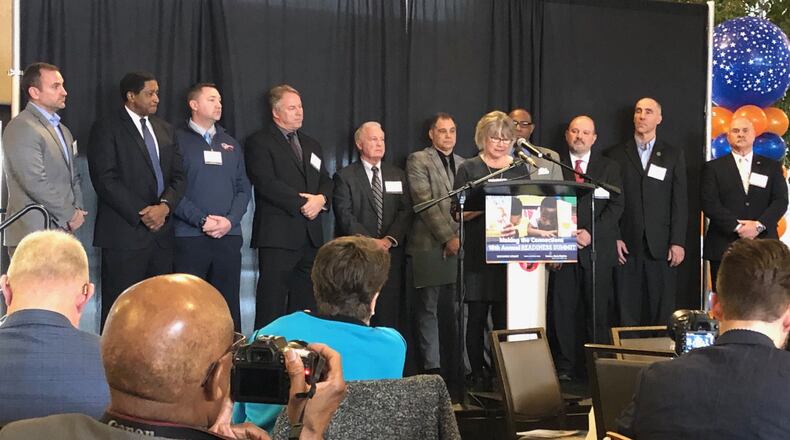2018 STORY: Preschool Promise cites success, still work to do
“Starting next school year, thanks to (Montgomery) County’s continuing commitment, we’ll be expanding,” Lightcap said. “We’ll continue our quest to someday get Preschool Promise countywide.”
Preschool Promise officials did not say Friday exactly how many more students would be served in 2019-20.
The program aims to help more local children attend preschool, via tuition assistance payments for families, and provides training to the preschool and daycare centers so they offer a higher quality of education and care. The biggest effort is in Dayton, where an income tax levy pays for services.
Nathan Warner, principal of Trotwood’s Early Learning Center, said his district has already been working on family engagement and mental health supports – two Preschool Promise staples.
RELATED: Preschool group to spread assistance to more families
“We’re marrying the academic strategies we’ve always known about with some of the social-emotional issues – addressing the whole child,” Warner said. “The instructional strategies alone are not going to move our kids forward. We need to address how they’re thinking, where they’re coming from and what the needs of the family are.”
Data from late last year showed that Preschool Promise 4-year-olds made “significant gains in school readiness” in 2017-18. But the program is limited to 4-year-olds, and limited geographically, so the countywide “kindergarten readiness” rate was stuck at 38 percent, below the statewide rate, which has inched up to 42 percent.
Lightcap called that 38 percent number “really frustrating,” as local officials continue to attack readiness gaps that show black children far behind white children and boys far behind girls.
RELATED: Preschool Promise working on barriers to school quality
“I am determined that we are going to get past that 40 percent mark,” she said. “Yes those gaps are consistent with national trends, but we don’t want to be consistent with that trend. … Preschool Promise is only impacting 1,800 4-year-olds, and our challenge is that we have to look at our whole system from birth to age 5.”
Gov. Mike DeWine will unveil his first state budget proposal next week, and he has spoken frequently about making early childhood issues a high priority, especially in low-income communities, not just in the schools, but in family homes.
Joy Parson, owner of ABC Child Development Center on Hoover Avenue in Dayton, said the cliché that it takes a village to raise a child is true. She said families need more involvement in their children’s education, and schools need continued training on behavior, child trauma and handling aggression.
RELATED: Preschool funding approved — $34 million over 8 years
Speakers at Friday’s 10th annual Readiness Summit focused on some of those obstacles that educators can overcome. Shauna Adams of the University of Dayton talked about family engagement. Michael Carter of Sinclair Community College focused on the power of each individual and the need for educational equity.
Jessica Davies of the Montgomery County Educational Service Center urged teachers to consider the traumas that some students bring to school, suggesting that adults who prove to those kids that they truly care about them can help children build the resilience to succeed.
Centerville kindergarten teacher Meryl Matthews said one challenge is fitting so much into a child’s day, as expectations have increased.
“We have moved more toward the academic piece of it, however all kindergarten teachers know developmentally appropriate practices, and they know that we have to incorporate movement and brain breaks,” she said. “We’re just a little bit more intentional in how we’re organizing our day to maximize the time for the kids.”
RELATED: Fewer children were “ready for kindergarten” in 2016-17
About the Author

